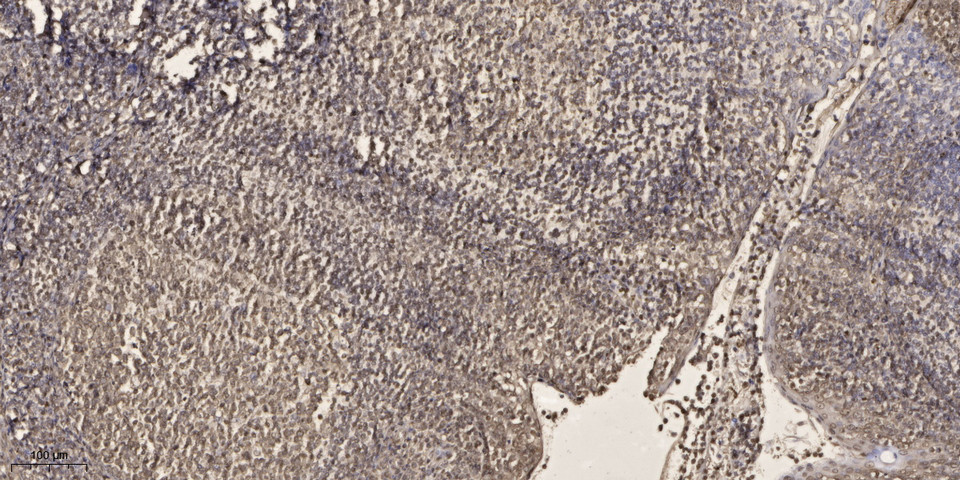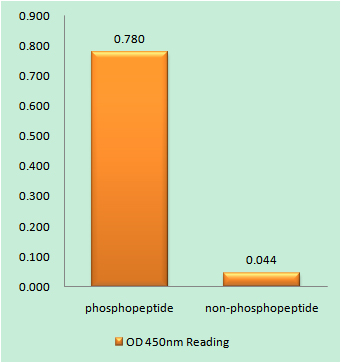SRF (phospho Ser103) Polyclonal Antibody
- Catalog No.:YP0611
- Applications:WB;IHC;IF;ELISA
- Reactivity:Human;Mouse;Rat
- Target:
- SRF
- Fields:
- >>MAPK signaling pathway;>>cGMP-PKG signaling pathway;>>Human T-cell leukemia virus 1 infection;>>Viral carcinogenesis
- Gene Name:
- SRF
- Protein Name:
- Serum response factor
- Human Gene Id:
- 6722
- Human Swiss Prot No:
- P11831
- Mouse Gene Id:
- 20807
- Mouse Swiss Prot No:
- Q9JM73
- Immunogen:
- The antiserum was produced against synthesized peptide derived from human SRF around the phosphorylation site of Ser99. AA range:71-120
- Specificity:
- Phospho-SRF (S103) Polyclonal Antibody detects endogenous levels of SRF protein only when phosphorylated at S103.
- Formulation:
- Liquid in PBS containing 50% glycerol, 0.5% BSA and 0.02% sodium azide.
- Source:
- Polyclonal, Rabbit,IgG
- Dilution:
- WB 1:500 - 1:2000. IHC 1:100 - 1:300. ELISA: 1:5000.. IF 1:50-200
- Purification:
- The antibody was affinity-purified from rabbit antiserum by affinity-chromatography using epitope-specific immunogen.
- Concentration:
- 1 mg/ml
- Storage Stability:
- -15°C to -25°C/1 year(Do not lower than -25°C)
- Other Name:
- SRF;Serum response factor;SRF
- Observed Band(KD):
- 51kD
- Background:
- This gene encodes a ubiquitous nuclear protein that stimulates both cell proliferation and differentiation. It is a member of the MADS (MCM1, Agamous, Deficiens, and SRF) box superfamily of transcription factors. This protein binds to the serum response element (SRE) in the promoter region of target genes. This protein regulates the activity of many immediate-early genes, for example c-fos, and thereby participates in cell cycle regulation, apoptosis, cell growth, and cell differentiation. This gene is the downstream target of many pathways; for example, the mitogen-activated protein kinase pathway (MAPK) that acts through the ternary complex factors (TCFs). Two transcript variants encoding different isoforms have been found for this gene. [provided by RefSeq, May 2014],
- Function:
- function:SRF is a transcription factor that binds to the serum response element (SRE), a short sequence of dyad symmetry located 300 bp to the 5' of the site of transcription initiation of some genes (such as FOS). Required for cardiac differentation and maturation.,PTM:Phosphorylated by PRKDC.,similarity:Contains 1 MADS-box domain.,subunit:Binds DNA as a multimer, probably a dimer. Interacts with MLLT7/FOXO4, NKX3A and SSRP1. Interacts with ARID2 and SRFBP1 (By similarity). Forms complexes with ARID2, MYOCD, NKX2-5 and SRFBP1.,
- Subcellular Location:
- Nucleus .
- Expression:
- Brain,Epithelium,Lung,Lymph,
- June 19-2018
- WESTERN IMMUNOBLOTTING PROTOCOL
- June 19-2018
- IMMUNOHISTOCHEMISTRY-PARAFFIN PROTOCOL
- June 19-2018
- IMMUNOFLUORESCENCE PROTOCOL
- September 08-2020
- FLOW-CYTOMEYRT-PROTOCOL
- May 20-2022
- Cell-Based ELISA│解您多样本WB检测之困扰
- July 13-2018
- CELL-BASED-ELISA-PROTOCOL-FOR-ACETYL-PROTEIN
- July 13-2018
- CELL-BASED-ELISA-PROTOCOL-FOR-PHOSPHO-PROTEIN
- July 13-2018
- Antibody-FAQs
- Products Images
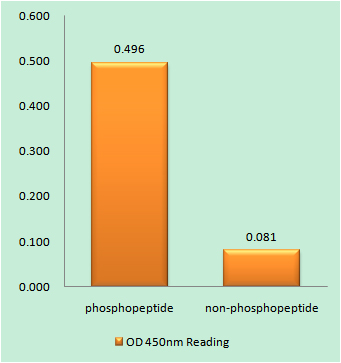
- Enzyme-Linked Immunosorbent Assay (Phospho-ELISA) for Immunogen Phosphopeptide (Phospho-left) and Non-Phosphopeptide (Phospho-right), using SRF (Phospho-Ser99) Antibody
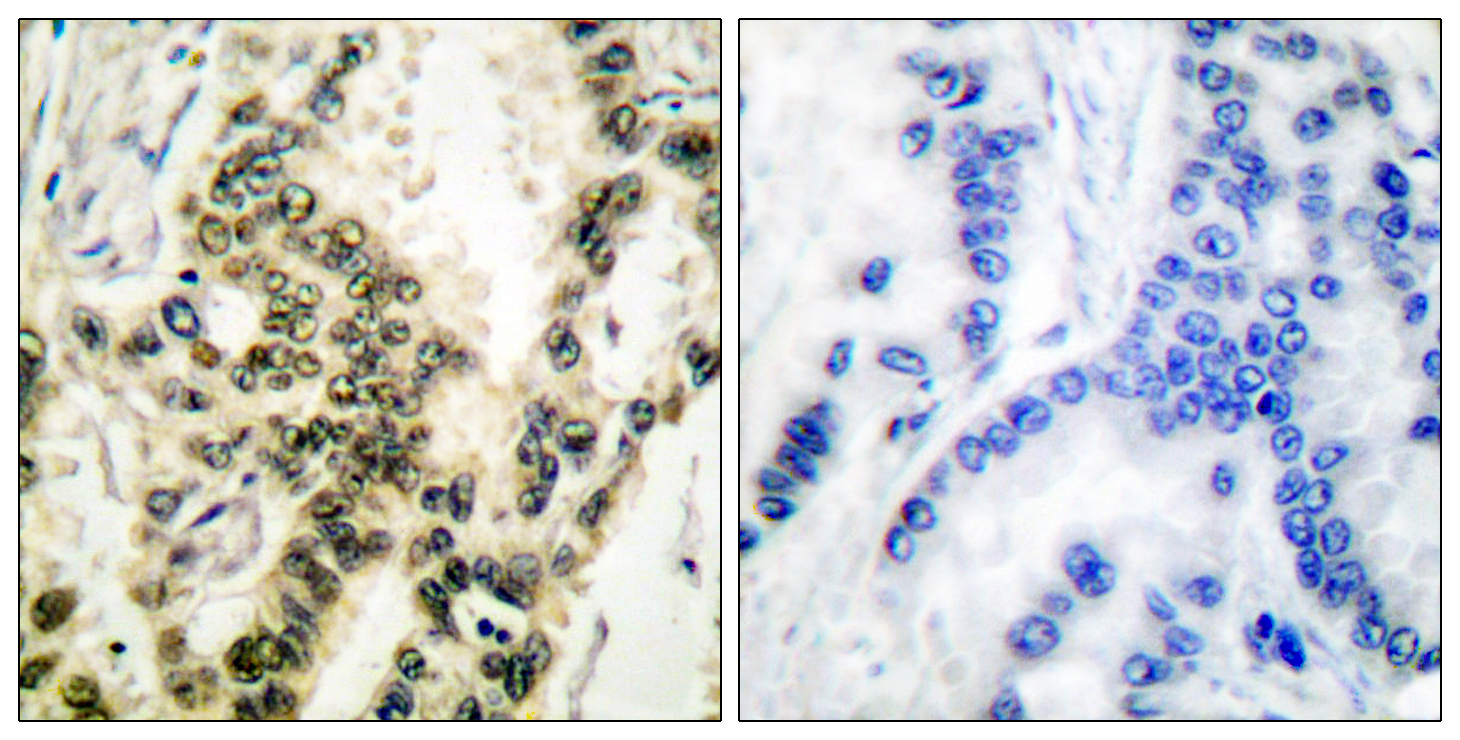
- Immunohistochemistry analysis of paraffin-embedded human lung carcinoma, using SRF (Phospho-Ser99) Antibody. The picture on the right is blocked with the phospho peptide.
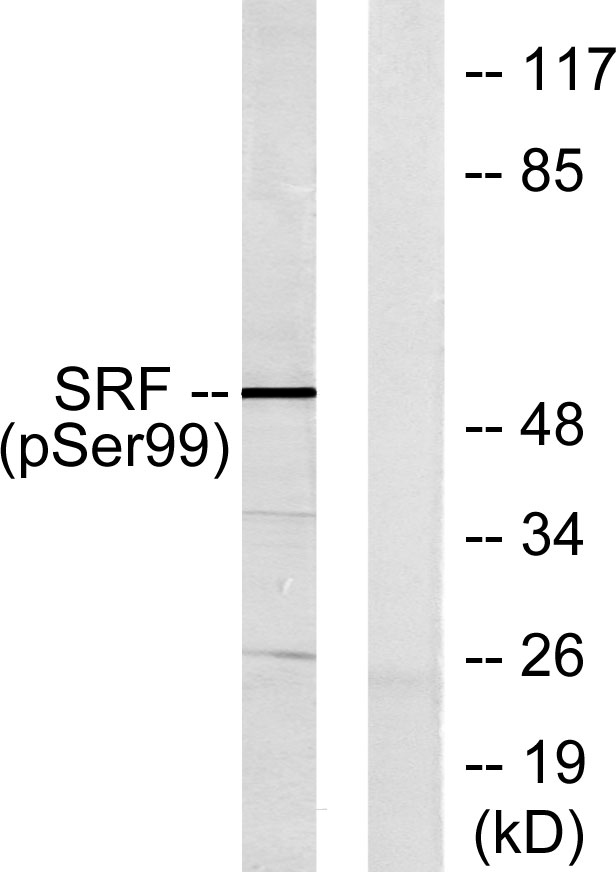
- Western blot analysis of lysates from LOVO cells treated with Serum 10% 15', using SRF (Phospho-Ser99) Antibody. The lane on the right is blocked with the phospho peptide.
